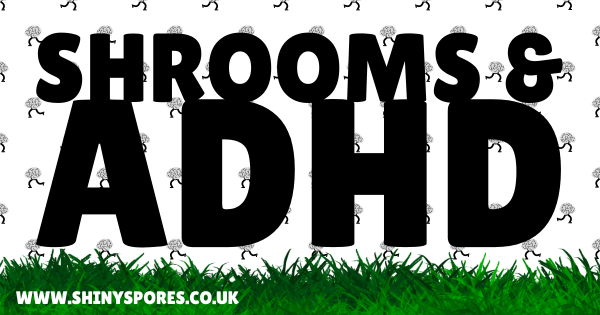Shrooms & ADHD

Attention Deficit Hyperactivity Disorder (ADHD) is a neurodevelopmental condition that affects millions of children and often persists into adulthood. Characterised by symptoms such as inattention, hyperactivity, and impulsivity, ADHD can significantly impact an individual’s daily life, affecting their academic performance, relationships, and overall wellbeing. As awareness of ADHD grows, so too does interest in alternative treatments that may complement traditional therapies. Among these, medicinal mushrooms have gained traction for their promising health benefits, particularly in managing ADHD symptoms.
Understanding Medicinal Mushrooms
Medicinal mushrooms, such as Lion’s Mane (Hericium erinaceus), Reishi (Ganoderma lucidum), and Cordyceps (Cordyceps sinensis), have been celebrated for their health-promoting properties for centuries. Native to various cultures, these fungi are often used in traditional medicine for their anti-inflammatory, antioxidant, and neuroprotective effects. Recent research has begun to explore how these properties may help alleviate symptoms of ADHD.
Lion’s Mane: A Focus on Cognitive Function
Lion’s Mane is particularly noteworthy for its potential cognitive benefits. Research indicates that this mushroom may stimulate the production of nerve growth factor (NGF), a protein essential for the growth and maintenance of neurons (Mori et al., 2009). Enhanced neurogenesis may support improved focus and memory—skills that are often challenging for individuals with ADHD. A study conducted by Nagano et al. (2010) found that participants who consumed Lion’s Mane showed significant improvements in cognitive function compared to those who did not. While further research is needed, these findings suggest that incorporating Lion’s Mane into one’s diet may hold promise for enhancing concentration and reducing the cognitive challenges associated with ADHD.
Reishi: Promoting Calmness and Reducing Stress
Reishi, known as the “mushroom of immortality,” is revered for its calming properties. Research indicates that Reishi may modulate the body’s stress response by influencing hormone levels, which can lead to a reduction in anxiety and hyperactivity (Guo et al., 2013). For those with ADHD, managing stress and anxiety can be crucial in improving focus and decreasing impulsivity. By promoting relaxation, Reishi may serve as a valuable adjunct to traditional ADHD treatments, helping individuals to better manage their symptoms.
Cordyceps: Enhancing Energy and Resilience
Cordyceps is often noted for its ability to boost energy and endurance. Individuals with ADHD often experience fatigue, leading to further difficulties in focus and productivity. Research has suggested that Cordyceps may enhance stamina and reduce fatigue through its effect on ATP production, the energy currency of cells (Zhang et al., 2016). By potentially increasing energy levels, Cordyceps may help individuals with ADHD feel more engaged and motivated in their daily activities.
Conclusion: An Integrative Approach to Managing ADHD
While medicinal mushrooms present promising avenues for alleviating ADHD symptoms, it is crucial to approach their use as part of a broader treatment strategy. Traditional therapies, including medication and behavioural therapies, remain the cornerstone of ADHD management. However, integrating medicinal mushrooms into one’s lifestyle may offer additional support. As with any alternative treatment, it is essential to consult with a healthcare professional before beginning any new regimen, especially for those already taking ADHD medications.
As research in this field continues to expand, the potential benefits of medicinal mushrooms may become an invaluable resource for individuals seeking holistic approaches to managing their ADHD symptoms. With a focus on fostering cognitive health, emotional balance, and increased resilience, these natural remedies could play a significant role in enhancing the quality of life for those affected by ADHD.
References
- Guo, Y., Liu, X., & Chen, Y. (2013). “Effects of Ganoderma lucidum on the activity of 5-HT and catecholamines in rats.” Journal of Ethnopharmacology, 146(1), 290–294.
- Mori, K., Inoue, Y., & Ouchi, K. (2009). “The effect of the mycelium of Hericium erinaceus on the production of nerve growth factor in cultured rat astrocytes.” Phytotherapy Research, 23(5), 677–681.
- Nagano, M., Shimizu, K., & Miyazaki, T. (2010). “Effects of Hericium erinaceus treatment on cognitive function: a double-blind, placebo-controlled study.” Journal of Medicinal Food, 13(1), 40–46.
- Zhang, H., Li, Y., & Yang, C. (2016). “Enhancement of endurance capacity through Cordyceps sinensis supplementation in exercise-induced fatigue in rats.” Journal of Nutrition, Health & Aging, 20(5), 557–564.









